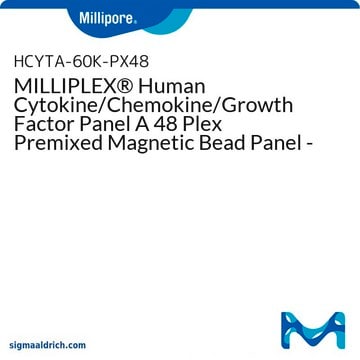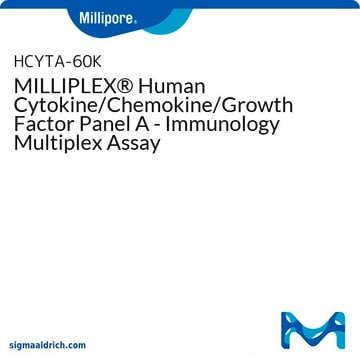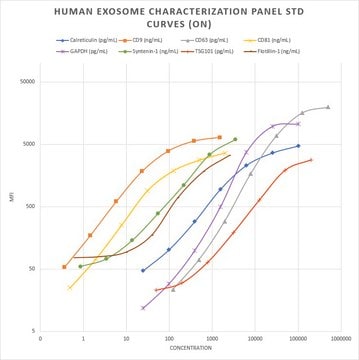HSCRMAG-32K
MILLIPLEX® Human Soluble Cytokine Receptor Panel- Immunology Multiplex Assay
Simultaneously analyze multiple cytokine and chemokine biomarkers with Bead-Based Multiplex Assays using the Luminex technology, in human serum, plasma and cell culture samples.
Synonym(s):
Human Cytokine Receptor Multiplex Kit, Luminex® Human Cytokine Receptor Immunoassay, Millipore Cytokine Receptor Panel
About This Item
Recommended Products
Quality Level
species reactivity
human
manufacturer/tradename
Milliplex®
assay range
accuracy: 91-104%
sensitivity: 4-208 pg/mL
(Overnight Incubation minDC)
standard curve range: 12.2-50,000 pg/mL
(sIL-4R, sIL-6R, sRAGE, sTNFRI, sTNFRII)
standard curve range: 122.1-500,000 pg/mL
(sEGFR, sIL-1RII, sVEGF-R1, sVEGF-R2, sVEGF-R3)
standard curve range: 24.4-100,000 pg/mL
(sCD30, sgp130, sIL-1RI, sIL-2Rα)
inter-assay cv: <15%
intra-assay cv: <10%
technique(s)
multiplexing: suitable
detection method
fluorometric (Luminex xMAP)
shipped in
wet ice
General description
MILLIPLEX® Human Soluble Cytokine Receptor Panel is to be used for the simultaneous quantification of 14 soluble cytokine receptors in human serum, plasma and cell / tissue culture supernatant samples. This kit uses a 96-well format, contains a lyophilized standard cocktail, two internal assay quality controls and can measure up to 38 samples in duplicate.
The Luminex® xMAP® platform uses a magnetic bead immunoassay format for ideal speed and sensitivity to quantitate multiple analytes simultaneously, dramatically improving productivity while conserving valuable sample volume.
Panel Type: Cytokines/Chemokines
Application
- Analytes: sCD30, sEGFR, sGP130, sIL-1RI, sIL-1RII, sIL-2Rα, sIL-4R, sIL-6R, sRAGE, sTNFRI, sTNFRII, sVEGFR1, sVEGFR2, sVEGFR3
- Recommended Sample type: Serum, plasma or tissue/cell lysate and culture supernatant
- Recommended Sample dilution: 1:5 dilution for plasma or serum or neat cell culture supernatant
- Assay Run Time: Overnight
- Research Category: Inflammation & Immunology
Features and Benefits
Other Notes
Legal Information
Signal Word
Danger
Hazard Statements
Precautionary Statements
Hazard Classifications
Acute Tox. 4 Dermal - Acute Tox. 4 Inhalation - Acute Tox. 4 Oral - Aquatic Chronic 2 - Eye Dam. 1 - Skin Sens. 1 - STOT RE 2
Target Organs
Respiratory Tract
Storage Class Code
10 - Combustible liquids
WGK
WGK 3
Certificates of Analysis (COA)
Search for Certificates of Analysis (COA) by entering the products Lot/Batch Number. Lot and Batch Numbers can be found on a product’s label following the words ‘Lot’ or ‘Batch’.
Already Own This Product?
Find documentation for the products that you have recently purchased in the Document Library.
Related Content
Multiplex assays simplify cancer research by measuring multiple biomarkers simultaneously for various signaling pathways.
Multiplex assays simplify cancer research by measuring multiple biomarkers simultaneously for various signaling pathways.
Multiplex assays simplify cancer research by measuring multiple biomarkers simultaneously for various signaling pathways.
Multiplex assays simplify cancer research by measuring multiple biomarkers simultaneously for various signaling pathways.
Our team of scientists has experience in all areas of research including Life Science, Material Science, Chemical Synthesis, Chromatography, Analytical and many others.
Contact Technical Service












